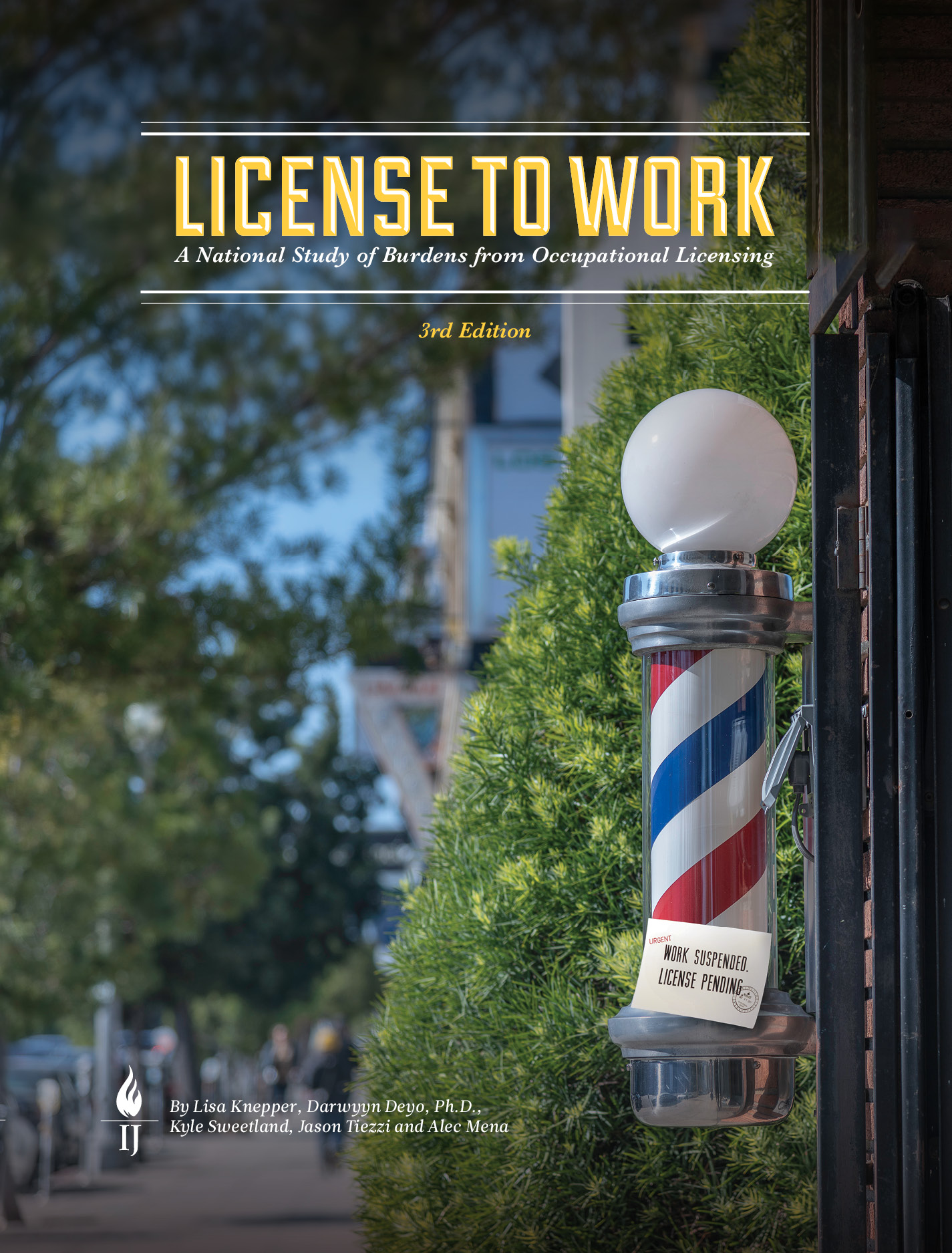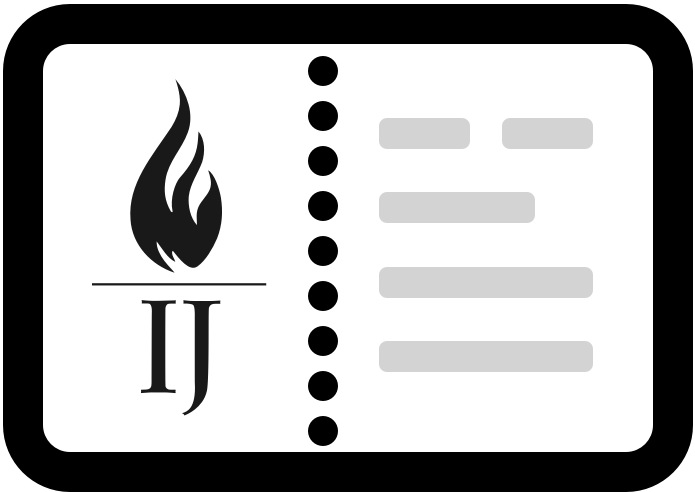Bill Collection Agency Occupational Licensing
License required in 29 states
64th most burdensome licensing requirements among moderate-income occupations
Average Fee for License:$608
What They Do
Bill collection agencies locate and notify customers of delinquent accounts by mail, telephone or personal visit to solicit payment. They receive payment and post amount to a customer’s account; prepare statements to a credit department if a customer fails to respond; initiate repossession proceedings or service disconnection; and keep records of collection and status of accounts. This report looks at what is required to run one’s own bill collection agency only.
Bill Collection Agency Licensing Overview
Twenty-nine states (more than half of states) require a licence to work as a Bill Collection Agency. On average, these laws require $608 in fees, 157 days of education and no exams. Bill Collection Agency Licenses have the 64th most burdensome requirements of the 102 occupations studied. Fees for a license exceed $1000 in Nevada, Colorado, Arizona, Massachusetts, Wisconsin, North Carolina, Minnesota.
Where is a Bill Collection Agency the most regulated?
Out of the 29 states that require an occupational license, an occupational license for a Bill Collection Agency has the highest burden in Idaho. Idaho requires $150 in fees, no exams, 3 years experience, and no education.
Where is a Bill Collection Agency the least regulated?
Out of the 29 states that require an occupational license, an occupational license for a Bill Collection Agency has the lowest burden in Louisiana. Louisiana requires $25 in fees, no exams, no experience, and no education.
Where is a Bill Collection Agency license the most expensive?
An occupational license for a Bill Collection Agency costs the most in Arizona. Arizona requires $1675 in fees, no exams, no experience, and no education.
Where is a Bill Collection Agency license the least expensive?
An occupational license for a Bill Collection Agency costs the least in Louisiana. Louisiana requires $25 in fees, no exams, no experience, and no education.
Where does it take the longest to obtain a Bill Collection Agency license?
An occupational license for a Bill Collection Agency takes the longest to obtain in Idaho. It takes 1095 days (3 years). Idaho requires $150 in fees, no exams, 3 years experience, and no education.
Where is it fastest to obtain a Bill Collection Agency license?
An occupational license for a Bill Collection Agency takes the least time to obtain in Alaska, Washington, Illinois, Arizona, Massachusetts, Arkansas, Wisconsin, Indiana, North Carolina, Minnesota, North Dakota, Rhode Island, Tennessee, Connecticut, Oregon, Maryland, Maine, Florida, Hawaii, Iowa, Utah, Louisiana (0 days).
What states require exams for a Bill Collection Agency license?
To obtain an occupational license for a Bill Collection Agency there is at least one exam required in: New Mexico, Nevada, Wyoming, Michigan.
Thirty-one states license bill collection agencies. On average, these laws impose $551 in fees and 159 days of experience—the 65th most burdensome requirements of the 102 occupations studied. However, because bill collection agencies are licensed by more than half of states, the occupation ranks as the 43rd most widely and onerously licensed.
License requirements vary widely across states. Idaho is the most burdensome state, requiring three years (1,095 days) of experience in the collections industry as well as $150 in fees. Seven states (Arizona, Colorado, Massachusetts, Minnesota, Nevada, North Carolina and Wisconsin) require over $1,000 in fees. However, Iowa, the least burdensome state, requires only a $10 fee and no experience.
States Ranked by Average Licensing Burden for 102 Lower-Income Occupations
More Burdensome Less Burdensome
Based on data released in November 2022| Burden Rank | State | Occupations Licensed | Fees | Estimated Calendar Days Lost | Education | Experience | Exams | Minimum Grade | Minimum Age |
|---|---|---|---|---|---|---|---|---|---|
| 1 | Idaho | 66 | $150 | 1095 | None | 3 years | 0 | 0 | 0 |
| 2 | New Mexico | 66 | $800 | 730 | None | 2 years | 1 | 12 | 18 |
| 3 | Nevada | 75 | $1,010 | 730 | None | 2 years | 1 | 0 | 21 |
| 4 | Colorado | 34 | $1,500 | 730 | None | 2 years | 0 | 0 | 0 |
| 5 | Nebraska | 61 | $400 | 730 | None | 2 years | 0 | 0 | 0 |
| 6 | Wyoming | 26 | $651 | 365 | None | 1 years | 1 | 0 | 0 |
| 7 | Michigan | 48 | $264 | 182 | None | 6 months | 1 | 12 | 18 |
| 8 | Alaska | 64 | $100 | 0 | None | None | 0 | 12 | 19 |
| 9 | Washington | 76 | $850 | 0 | None | None | 0 | 0 | 18 |
| 10 | Illinois | 41 | $750 | 0 | None | None | 0 | 0 | 18 |
| 11 | Arizona | 68 | $1,675 | 0 | None | None | 0 | 0 | 0 |
| 12 | Massachusetts | 50 | $1,351 | 0 | None | None | 0 | 0 | 0 |
| 13 | Arkansas | 72 | $145 | 0 | None | None | 0 | 0 | 21 |
| 14 | Wisconsin | 42 | $1,200 | 0 | None | None | 0 | 0 | 0 |
| 15 | Indiana | 37 | $200 | 0 | None | None | 0 | 0 | 18 |
| 16 | North Carolina | 66 | $1,048 | 0 | None | None | 0 | 0 | 0 |
| 17 | Minnesota | 35 | $1,010 | 0 | None | None | 0 | 0 | 0 |
| 18 | North Dakota | 65 | $851 | 0 | None | None | 0 | 0 | 0 |
| 19 | Rhode Island | 70 | $801 | 0 | None | None | 0 | 0 | 0 |
| 20 | Tennessee | 69 | $750 | 0 | None | None | 0 | 0 | 0 |
| 21 | Connecticut | 65 | $600 | 0 | None | None | 0 | 0 | 0 |
| 22 | Oregon | 69 | $401 | 0 | None | None | 0 | 0 | 0 |
| 23 | Maryland | 58 | $350 | 0 | None | None | 0 | 0 | 0 |
| 24 | Maine | 46 | $300 | 0 | None | None | 0 | 0 | 0 |
| 25 | Florida | 55 | $200 | 0 | None | None | 0 | 0 | 0 |
| 26 | Hawaii | 64 | $167 | 0 | None | None | 0 | 0 | 0 |
| 27 | Iowa | 71 | $50 | 0 | None | None | 0 | 0 | 0 |
| 28 | Utah | 64 | $32 | 0 | None | None | 0 | 0 | 0 |
| 29 | Louisiana | 77 | $25 | 0 | None | None | 0 | 0 | 0 |

License to Work
The data and information here come from IJ’s License to Work report, released in November 2022.
View Report

